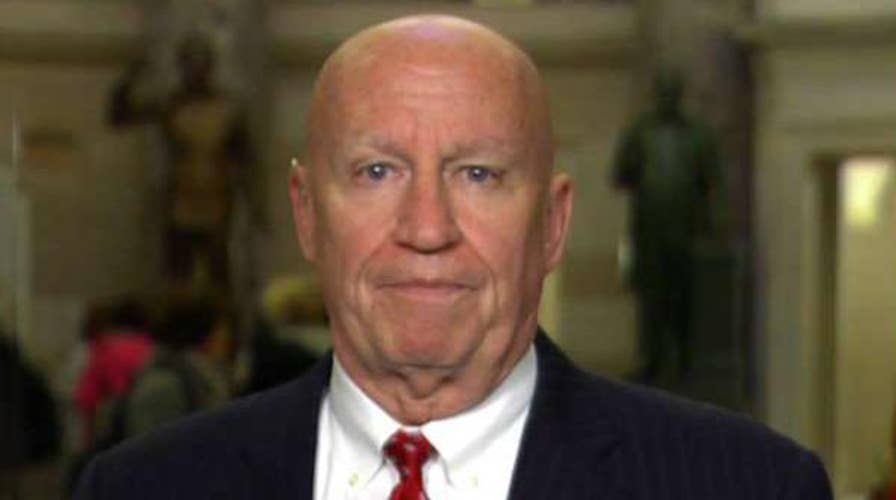Rep. Kevin Brady addresses tax reform rumors
Chairman of the House Ways & Means Committee says he is pleased by the effort Republican lawmakers are making on the GOP tax bill in conference, praises President Trump's leadership.
House conservatives are launching a full-court press to preserve a key provision rolling back ObamaCare in the final tax-reform bill being crafted behind closed doors by congressional negotiators.
The charge is being led by North Carolina GOP Rep. Mark Walker, chairman of the Republican Study Committee, who’s asking the negotiators to include a repeal of the so-called ObamaCare individual mandate, which was included in the final Senate tax plan but not in the House version.
“ObamaCare’s coercive individual mandate represents perhaps the worst example of the federal government violating individual freedom and liberty -- which is why we have repeatedly promised to repeal it,” Walker and 70 other committee members said in letter to lead negotiators Texas Rep. Kevin Brady and Utah Sen. Orrin Hatch. “We urge you to help fulfill our promise to the American people and include this language in a final conference package.”
The mandate is among a slew of key issues negotiators are taking up as they race to beat a Christmas deadline -- a tight timeline that has Democrats claiming the bill, which they largely oppose, is being rushed.
Another big stumbling block is how much state and local taxes Americans will be allowed to deduct and whether to cut the corporate tax rate from 35 percent to 20 percent, or to a slightly higher level of around 22 percent.
The change would help Republicans stay within congressional budgetary rules that would allow them to pass a final bill with a simple, 51-vote majority in the Senate. Any plan that adds more than $1.5 trillion to the deficit would require a 60-vote majority. Republicans have only 52 senators, and no Democrats have voted in favor of either GOP plan to overhaul the tax code.
Democrats and other critics have leveled a ton of criticism at the bill -- claiming that it’s a corporate giveaway masked as a gift to the middle class and that the hasty, roughly month-long process has lacked transparency.
Washington GOP Rep. Cathy McMorris Rodgers, a member of House Speaker Paul Ryan’s leadership team, told reporters on Tuesday that a public hearing on the plan is scheduled for Wednesday, in an apparent effort to deflect such criticism.
“I suspect over the next few days we’ll continue to hear the scare tactics that … tax reform is Armageddon, bad for women and people will die,” she said. “This is really getting ridiculous.”
McMorris and Ryan also argued, as they have in recent weeks, that the GOP plan will create jobs, increase paychecks and double the standard tax deduction so that many average American families will have nearly $1,200 more a year in the bank.
But GOP leaders did not say whether the ObamaCare provision might remain.
“I'm not going to go into the negotiations that are ongoing between the conferees,” said Ryan, R-Wis. “As to these other particular issues, that's something the conferees are going to have to wrestle with. There are a million provisions in the [tax] code that they are going through. And I’m not going to prejudge.”
The individual mandate requires Americans under ObamaCare to buy insurance or face a tax penalty.
Its potential repeal has only served as another rallying cry for Democrats. House Minority Leader Nancy Pelosi warned on Tuesday that the GOP is indeed on course to repeal the individual mandate.
“Republicans are running full steam ahead with a repeal of [ObamaCare] and the tax scam that would bust our deficit,” the California Democrat said in a fundraising letter to supporters. “They are preparing for an all-out assault on our benefits, Medicare, Medicaid and food-assistance initiatives.”
To be sure, essentially every elected Republican in Washington campaigned on a promise to repeal and replace the 2010 health care law known as ObamaCare.
However, Senate Republicans failed this summer to pass a final bill on scrapping the law, handing President Trump a stinging defeat.
Repealing the mandate would at least give Republicans a significant victory toward the larger goal of a full repeal-and-replace.
The president wants a final GOP tax plan on his desk before Christmas.
Beyond the argument that the individual mandate smacks of government overreach, repeal supporters also argue nixing it will save the federal government billions now being given to those who cannot afford the insurance on their own.
Democrats warn that nixing the mandate would throw the insurance markets into chaos, by depriving the pool of healthier customers, and result in many dropping coverage.
Some Republicans want the repeal effort out of tax plan to avoid a hot-button issue derailing their efforts.
The roughly 154-member Republican Study Committee is influential, considering it makes up roughly 64 percent of the 239-member House GOP caucus.
However, members have less influence now that negotiators, including Brady, chairman of the tax-writing House Ways and Means Committee, and Hatch, chairman of the Senate Finance Committee, are working behind closed doors on the bills.





